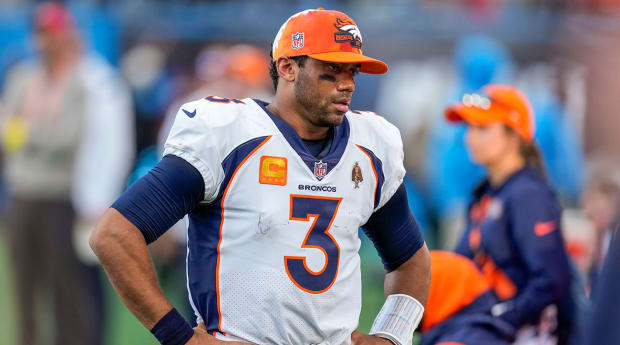Whenever I’m trying to get my coworkers moving in the right direction, I often, in plain view of the whole company, seek out the highest-paid employee I can find and scream at them. As far as morale boosts go, this is the secret sauce.
This is how Broncos defensive lineman Mike Purcell and quarterback Russell Wilson attempted to couch a moment during Sunday’s embarrassing loss to the Panthers. Purcell, when running off the field, hollered something into Wilson’s facemask like Wilson had cut him off for the last parking space at the mall. Wilson seemed to nod like someone who was nervously trying to wave off an office PajamaGram.
Even if these events were true, even if this was what happened and the clip on television allowed our imaginations to take the whole moment out of context, why is Purcell the one trying to provide his team with a spark? Why is this the avenue he’s chosen? Why isn’t Wilson yelling and screaming? Why isn’t the guy who is positively unfireable until at least 2026 doing something other than trying to make himself seem like he’s not the problem?

Jim Dedmon/USA TODAY Sports
These are the biggest questions for the Broncos moving forward. While we all seem to have our minds made up about this current regime, and are ready to rubber-stamp the whole thing a failure and watch them move on from the coach after one season, we’ve yet to ask ourselves who might want to inherit this mess.
To be clear, we’re not advocating for anyone’s firing. Nathaniel Hackett has worn a majority of the criticism for this season and, in the eyes of most people who are paid to have an opinion about the NFL, he’ll be the one who pays the price for the whole thing. Google “Fire Nathaniel Hackett” and you might get as much reading material as if you’d searched “World Cup.” This idea isn’t new; it probably isn’t far-fetched, but it may ultimately be the path to a more prolonged misery in Denver.
If I were in a position of power with the Broncos, I’d ask myself what Wilson has done to alter the course of this season and what he has done in prior stops when his back was against the wall. Never mind dressing and acting like the perfect host when company is around. What can we continue to expect from an investment that is literally 10 times the one we made in Hackett?
Ask a prospective head coach about taking an NFL gig, and they’ll likely answer with some form of the phrase: Every rose has its thorn. There are only 32 of these jobs. Each team has a frustratingly meddlesome owner, a completely nonexistent fan base, a depleted receiving corps or a shell of a defense.
The Broncos, though, are somewhat unique. Like the Browns, Cardinals and Packers, the sheer heft of the quarterback’s contract in comparison to the relatively unproven nature of the coach in place makes these quarterbacks nearly as powerful as the owners in that they could easily dictate someone else’s hiring and firing via their own performance. This is, in many ways, scarier and more slippery than the idea of inheriting a Davis Mills or a Daniel Jones. There is no built-in trial-and-error period. There is a supposed standard.
Additionally, prospective coaches are big people watchers. I’ve written about this before, but when the quarterback leaves the room, what do other players do? What do they say? Is the exchange between Wilson and Purcell nothing, or is it everything?
Earlier this week, we watched the Jets’ Zach Wilson work his way out of a starting role via a long process cemented by his inability to take enough of the blame for an inept offensive performance. Ultimately, the idea that quarterbacks should be laughably, painfully contrite after losses is silly. As a country, we really know how to play up this kind of self-flagellation and expect it from everyone else but ourselves when you-know-what hits the fan.
And Russell Wilson, to his credit, has said what the Jets hoped Zach Wilson would say on several occasions, like after the Colts loss two months ago. But for the price, the Broncos should expect—and receive—something more than just the bare minimum. They should expect someone who holds his teammates accountable enough that they don’t feel like taking matters into their own hands.







